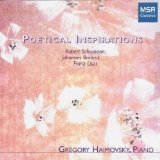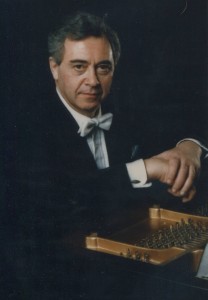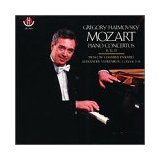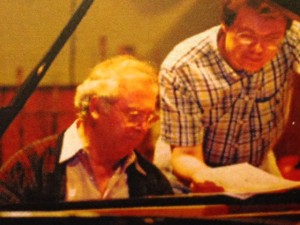Claude Debussy — “…Feux d’artifice” from Préludes, Book II
Mozart Concerti — Gregory Haimovsky, piano; Alexander Vedernikov, conductor, Orchestra of Cinematography, Moscow, 1995
Concerto No. 13 in C Major, K. 414 Allegro
Andante
Rondeau (Allegro)
Larghetto
Tempo di Menuetto
Mozart Concerti — Gregory Haimovsky, piano; Alexander Vedernikov, conductor, Russian Philharmony, Moscow, 2005
 Concerto No. 9 “Jeunehomme-Konzert” in E-flat Major, K. 271
Concerto No. 9 “Jeunehomme-Konzert” in E-flat Major, K. 271
Allegro molto
Romanze
Rondo
 Johannes Brahms
Johannes Brahms
“… ballads sung by Haimovsky in such a way that it was impossible to imagine any better.” — Badische Zeitung, Germany
“Haimovsky performed the Four Ballads, Opus 10 by Johannes Brahms fluidly, and imparted to each ballad its own characteristic mark. He achieved dramatic tension impressively, using ritardandi and strongly underlined contrasts. In spite of this, all the melodious, lyrical episodes did not suffer one bit.” — Badische Zeitung, Germany
Four Ballads, Op. 10:
I. Andante Allegro Tempo I (D Minor)
II. Andante-Allegro Non Troppo -Molto Staccato E leggiero-Andante (D Major)
III. Intermezzo-Allegro (B Minor)
IV. Andante Con moto Piu lento Tempo I (B-Major)
Robert Schumann
“Schumann’s ‘Blumenstuck’ was not projected outward toward the audience but shared privately like a secret…” — Bernard Holland, The New York Times
“…with the Schumann Arabesque, Op. 18, Haimovsky immediately demonstrated the grand romantic style.” — George A. Sinclair, The NAPA Register
“…the Schumann pieces from Opus 19 and 99 were a refined retreat inwards — as if the listener were being taken carefully into the composer’s confidence. So on through the evening. Haimovsky’s maturity and daring make him something more than one is apt to encounter…He uses his hands as a medium to express the music that has ripened in his mind.” Daniel Ziff, The Jerusalem Post
Blumenstuk Op 19Franz Liszt
Valse oubliee No.4
“This listener has never heard [Liszt’s Sonetto del Petrarca so sensuously shaped and exquisitely tinted.” Bernard Holland, The New York Times
Badische Zeitung writes: “Haimovsky is a pianist of contrasts…his powerful and passionate touch dominated everything. He achieved the highest art of his piano touch. Liszt’s B-minor Sonata sounded as if it had been composed especially for Haimovsky. At times it swelled with energy, grandeur, resounding accents and noble hymns, that alternated with the tenderest soft and lyrical passages…” George Drapeau (Gannet Westchester Newspaper) notes “the piano’s thunder” emerged as “desires fulfilled in [Haimovsky’s] commanding and stunning performance…One must always be aware of the pitfalls of overkill when performing Liszt since so much of the score lends itself to bravura fancy and abandon. Haimovsky, however, resisted these temptations and presented a meticulously sculpted sonata, which was tastefully balanced and leanly articulated even during its more assaulting moments.”
 Claude Debussy
Claude Debussy
From Images, Book I
Reflets dans l’Eau


